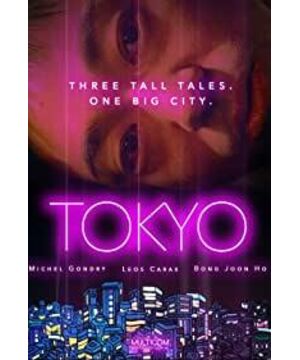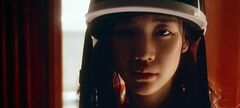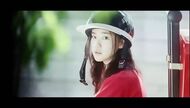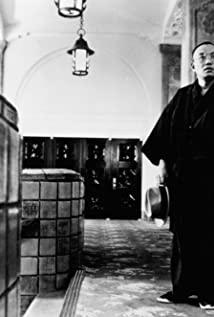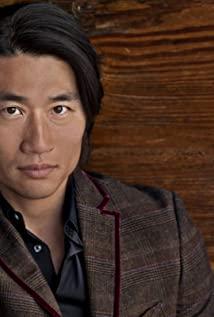The Folding Tokyo film is divided into three parts, each of which is directed by three directors who are not Japanese directors, so the style is completely different, and it also shows different aspects of Tokyo. The first story of interior design tells a series of stories about a young couple who came to Tokyo for development, lived in the house of their best friend, and then faced the pressure of the big city. The pressure of this big city is in all aspects, so you can feel its existence at any time in the film. The house where my girlfriend lives is very small, and my girlfriend told her that "the bigger the company, the smaller the house", which is the current situation of young people in an international metropolis like Tokyo. In order to pay for the house, the best friend needs to work early every day. At the same time, this pressure is also reflected in their difficulty in finding a house. The heroine searched for more than ten houses successively, but in the end she went through junk houses, capsule apartments, dilapidated and old houses, and in the end, she still could not rent the house that Xinyi wanted. On the other hand, it is also because the funds of the two are tight, and the housing prices in Tokyo are ridiculously high. Again, there is work pressure. For the sake of renting a house and living expenses, the two of them looked for jobs everywhere, and in the end they could only find a job as a packer, and they could only earn "peanuts" money (a meager salary) every day. And being a female heroine bears even more pressure. After the car was towed away by the traffic department, she herself came to the place of impoundment. However, she couldn't afford the high fines and towing fees, but in order to make her lover's movie show on time, she carried all the movie equipment alone. At this time, her lover's movies became her burden. At the same time, being an artist's girlfriend is often neglected by her lover. Just like what the middle-aged woman said to her after the movie was over: it is hard to fall in love with artists, and they need a lot. Often for the sake of art, our problems are ignored. And after the movie is over, the intimate actions of the male protagonist and his girlfriend are a microcosm. As an artist, she often faces female admirers, so the heroine always faces the risk of her lover cheating. Under such pressure, the heroine found herself gradually losing value, so after she heard her best friend complaining to her boyfriend about her, she began to escape in her dream. She dreamed that she had turned into a chair, away from her boyfriend and girlfriends and other people she knew well, and escaped all the pressure of renting a house and working. She finally got the life she wanted, doing what she wanted to do. And her new owner (husband) is a musician, in fact, the ideal incarnation of her boyfriend, who is obsessed with art and does not engage in other relationships between men and women. Every time he studied and played, he sat on the heroine and regarded her as a support, which made the heroine feel his worth. So she wrote in the letter, "My life is bland, and I have never felt so useful in my life." And this experience of the heroine in Tokyo is actually just a A microcosm of human life in modern society. The movie setting of the heroine's boyfriend: In a major earthquake in the future society, most of the human beings died, and the remaining people became monsters, which is an innuendo to modern society. In modern society, people are gradually alienated and become monsters, losing their humanity and the right to define their own value. The first is dehumanization. The most direct manifestation is that when the heroine went to pick up the car, the old man in charge of collecting the fine made things difficult for her in every possible way. Because he had pneumonia, he passed the pain on to others. The second is that the girlfriend and her boyfriend have repeatedly suggested that they move out and complained that the heroine is useless. Under the enormous pressure of modern life, pure friendship gradually ceases to exist. But the director remains optimistic about human nature. So another old man was arranged to help the hostess find a car, and another old man helped the hostess when she turned into a chair. In the end, people lose the right to define their own value. The heroine and her boyfriend once had an argument about ambitions and hobbies. The heroine said: "You say I have no ambitions, but it's not right, I like photography, art, I have a boating license, and I read a lot of books." Boyfriend: "But those are hobbies, different from ambitions. You must be able to be in this The world defines yourself by what you do, and you have to surpass others in these areas.” In modern society, your value is not determined by your hobbies in a certain area, but by your revenge in this area, depending on How much value can you create in this respect beyond others. And this kind of value is defined by the whole society with its standard, and people lose the right to define their own value. Mr. Dmitry The image of Mr. Dmitry is the Holy Fool of the Russian Orthodox Church, also known as the Dian Monk, usually a filthy, half-naked, half-crazy wanderer. Many of them could not speak, but their voices were used as oracles. As for whose oracle, of course, it was the oracle of the director Calex, who borrowed Mr. Dmitry to convey his views on Japanese nationalism. The French lawyer defending Dmitry has a similar image to Dmitry. He has long nails, white eyeballs, and a similar hairstyle. He can actually be regarded as a doppelganger of Dmitry. The director arranges his role in the film to defend Dmitry and, more importantly, to translate his oracles to the audience. He is one of the three people in the world who can understand Mr. Dmitry's language, and the other, of course, is the director Calex, who is the creator of the language. Dmitry lives in the dark sewers, where there are tanks from World War II, chemical experimental instruments, old Japanese flags, bullets, grenades, and the words "To Nanjing Heroes 1937" are written on the walls. Everything implies that under the surface of Japan's fast-developing modern society, the remnants of Jun nationalism still linger. Mr. Mead got out of the sewer first. After eating chrysanthemums, banknotes. The chrysanthemum is the family crest of the Japanese emperor, the symbol of the Japanese royal family and political system, and the banknote is the symbol of the Japanese economy. Mr. Dmitry is devouring Japan's politics and economy, and at the same time devouring the juntaist ideology represented by the Emperor of Japan, and taking revenge on behalf of all countries that have been invaded by Japan. Then he licked the armpit of a beautiful girl in a miniskirt, which should be a symbol of Japanese otaku culture. Mr. Dmitry found out that it had nothing to do with nationalism, so he let her go. The first reports of Mr Dmitry were full of stigmatisation and hyperbole, and the fear was evident. Then Mr. Dmitry used the grenades of World War II to kill civilians, which was his revenge for Japanese patriotism. After he was caught by the police, the views of the countries were reported on television. The first US thinks he is a terrorist like bin Ladeng, because the US is also a nationalist country, so it is natural to jump out and stigmatize Mr. Dmitry. The second is that a mother from Siberia called Mr. Dmitry her son, which corresponds to his identity as the Holy Fool of the Orthodox Church. The third Japanese woman said that she had seen him in Aum religion, which is the product of the Sanskrit religion formed by the Hindu Reform after the localization in Japan, which corresponds to Mr. Dmitry's birth of the Orthodox Church formed by the Christian Reform after the localization in Russia. . Finland, who was not affected by World War II, simply said that he had seen him in a Hungarian copper smelting movie. Then into the climax of the trial: "What's the motive?" "I don't like innocent people, I don't like people." "If you don't like it, why don't you kill yourself?" "I love life." "At least terrorists still have A dignified suicide attack." (This satirizes the Bushido spirit of Japanese juntaism, which is not cherishing one's own life.) "Among all, the Japanese are the most disgusting." "No one forces you to live in ours. In the country." "My God forced me, and my God always put me where I hated the most." (Director Callex, who is God, always puts Mr. Meade where he hates, and then uses He rebels against this environment. In another film, "Sacred Car Dealer," the director uses Mr. Dmitry to express his rebellion against the film's gradual pursuit of visual supremacy.) "What are you against in Japan?" " They've lived too long, and their eyes are like women's yin." (Here it can be seen that the director is not opposed to all Japanese, but to the ideas of jun nationalism lurking in Japanese society. They have continued for nearly Hundred years, too long to live. Their souls are like there just as dirty. ) "Mr. Dmitry, do you think you are very handsome?" "I don't know. If I did, I would say yes. I've never looked at myself, and my god doesn't have a mirror. But my mother once said I'm a beautiful boy." "Your mother cheated you badly." "My mother was a saint, and all of you raped her, and I am your son." (Said earlier as Holy Fool, May Mr. De's mother is a Siberian. The director here is particularly useless to Russia, because his mother should be a former sulian. Rape refers to Japan's aggression against the sulian. In this sense, Mr. Dmitry is two The development of the two ideas of the country, he is a contradictory collection. On the one hand, he hates the idea of nationalism and takes revenge on it. On the other hand, he has this kind of thinking, he hates innocent people and kills ordinary people .) He then used the microphone to mentally attack everyone. This is a torturing of the souls of all the Japanese in front of the screen, whether you have jun nationalism thoughts, and whether you reflect on and feel guilty about your country's past aggression. Then the Japanese people were divided into two factions, one supported the killing of Dmitry, and the other supported the release of Dmitry. This shows that the Japanese people still have some reflections. The Pope of Rome was the first to condemn his actions. Because Mr. Dmitry is a holy fool of the Orthodox Church and a part of Christianity, the Holy See immediately drew a clear line with him to protect himself. However, a religion with Mr. Dmitry as an idol was established, which shows that Mr. Dmitry has already had an impact on Japan, and his ideas have begun to spread in the society. Next is the execution scene. The lawyer sits in the center in a kimono with a chrysanthemum family crest, representing the emperor and a symbol of the country. The Japanese man leaning on the stick of civilization next to him is the embodiment of Jun nationalism. Although he is decorated with civilization, his back is full of blood and killing. The American woman in red is a symbol of American nationalism, and she is not affected by Japanese law, so she wears a red skirt at the execution scene. These two ideas influence the thinking patterns of the top Japanese political circles on the left and right. The lawyer's prayer for Mr. Dmitry represents the director's hope that Japan can repent and reflect on the crimes it has committed, and completely abandon the patriotism. Finally, Mr. Dmitry was resurrected and disappeared, and then a preview of "Mr. Dmitry's New York Trip" appeared on the screen, and a white eyeball appeared in Washington on the dollar. It indicates that Mr. Dmitry may be re-arranged by the director to the place he hates - the United States, to resist and retaliate against the nationalism there. Japan trembles, this is an otaku played by Kagawa Teruyuki after 10 years in the house, because he fell in love with himself The story of Yu Aoi, the pizza delivery girl, who decides to go out of the house to save her. The director's development of the house has become a common problem in Japan. During the process of Aikawa's rescue of Yu, he found that the street was deserted, and only robots were delivering goods on the street. And things like food delivery, phone calls, and the Internet make this secluded life possible. These otaku nerds hate to be in contact with people (society), hate and touch the sun (nature), they shut themselves in a small world. Time seems to have stopped flowing on them, the world is changing, and the otaku played by Aikawa has not moved for ten years. The director believes that otaku will become a kind of obsessive-compulsive disorder, just like Aikawa keeps everything in order. Once you have this kind of obsessive-compulsive disorder, it may be affected for a long time or even a lifetime. As Aikawa said: If you don't come out now, you will never come out. This long otaku life will add a lot of obstacles to their lives. For example, Aikawa is helpless after Yu faints and hesitates at the door for a day before deciding to save Yu. The takeaway girl played by You has many function buttons, which means that many jobs in modern society are turning people into machines. Speaking of when the technology is developed to allow me to order a robot of the same style as Aoi Yu, it has no other meaning, just to express my admiration. The director believes that there is still a solution to this social problem. Just as the physical tremor of an earthquake can drive everyone to the street, love is also a kind of spiritual tremor, and he can make all the otaku men and women end their otaku life to welcome them. a better future. At the end of the film, Aikawa pressed the button with "Love" written on Yu's body, which brought a shudder to her heart and successfully saved her from the life of an otaku. Can't get out. This long otaku life will add a lot of obstacles to their lives. For example, Aikawa is helpless after Yu faints and hesitates at the door for a day before deciding to save Yu. The takeaway girl played by You has many function buttons, which means that many jobs in modern society are turning people into machines. Speaking of when the technology is developed to allow me to order a robot of the same style as Aoi Yu, it has no other meaning, just to express my admiration. The director believes that there is still a solution to this social problem. Just as the physical tremor of an earthquake can drive everyone to the street, love is also a kind of spiritual tremor, and he can make all the otaku men and women end their otaku life to welcome them. a better future. At the end of the film, Aikawa pressed the button with "Love" written on Yu's body, which brought a shudder to her heart and successfully saved her from the life of an otaku. Can't get out. This long otaku life will add a lot of obstacles to their lives. For example, Aikawa is helpless after Yu faints and hesitates at the door for a day before deciding to save Yu. The takeaway girl played by You has many function buttons, which means that many jobs in modern society are turning people into machines. Speaking of when the technology is developed to allow me to order a robot of the same style as Aoi Yu, it has no other meaning, just to express my admiration. The director believes that there is still a solution to this social problem. Just as the physical tremor of an earthquake can drive everyone to the street, love is also a kind of spiritual tremor, and he can make all the otaku men and women end their otaku life to welcome them. a better future. At the end of the film, Aikawa pressed the button with "Love" written on Yu's body, which brought a shudder to her heart and successfully saved her from the life of an otaku.
View more about Tokyo! reviews


